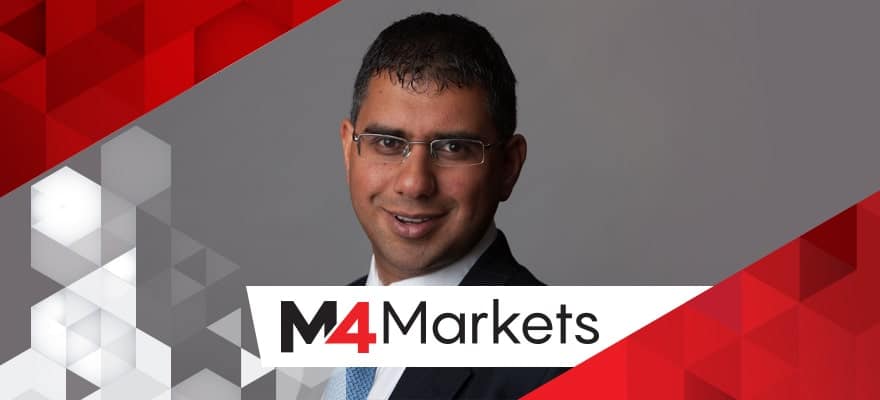The brokerage industry received a massive boost in 2020 with the high retail influx, which prompted new players to enter the industry. M4Markets is one of these new brokerages with ambitious plans to operate in the crowded market.
The broker offers trading services with Forex , commodities, indices and stock CFDs on MetaTrader4 and MetaTrader5 platforms.
Finance Magnates recently had an elaborated chat with M4Markets’ CEO and Executive Director, Deepak Jassal, and discussed his developments in the forex industry. He also opened up about his ambitions with the M4Markets, and how he is preparing to ace in a highly-competitive market.
First, could you give us an overview of your career path and how you got started in the financial industry?
I was always involved in the financial sector as I studied Accounts and Finance and then followed a career specialized in Capital Markets. I worked at UBS, KPMG and HSBC in London and abroad where I had the opportunity to be an advisor to financial technology firms. The fintech space really captured my interest, and I worked independently as an advisor to fintech companies for a few years before M4Markets.
M4Markets is a new brand in a market where many big players are operating. So, can you tell us a bit about the M4Markets' back story? And, what prompted you to open up a brokerage firm?
M4Markets was essentially born out of the idea of creating a brokerage that focuses on client service. My background in banking taught me to think of clients as partners, and we wanted to set up a brokerage that would follow these guidelines.
From regulations to politics, many things impact Forex Trading . What do you think are the biggest challenges faced by the forex industry today?
The pandemic took all of us by surprise, so it will be interesting to see how things evolve for different business models.
Addressing ongoing regulatory change is a priority for our industry, and companies need to continually invest in new technology and human resources to meet these changes, especially for those with multiple regulations.
What do you think is the most significant trend that will impact the future of the Forex industry in the next 5 years?
The biggest change we will see is a new generation of traders entering the trading space who have a larger appetite for risk and are very demanding with the technological infrastructure of the brokerages they partner with. This means that the markets will also need to focus on APIs, plugins, and new trading platforms that make trading more efficient.
Now coming to M4Markets, being a young broker, what are your strategies to win clients, especially when competing with big names? Are you targeting any particular niche of traders?
We may be a young broker but our team is made up of professionals with many years of experience in the industry, and that allows us to create a best-in-class business from the start. Features such as instant withdrawals for clients and introducers as well as tailor-made partnership opportunities combined with institutional levels of service in a retail environment is the main angle we focus on.
The business-model and the broker’s attitude towards the traders are very crucial. So, how are you keeping M4Markets a customer-focused and not a sales-driven company?
Customer service is at the heart of our organization, and our products and services have been designed to be open and transparent to clients so that they can see and understand what we do.
We are also committed to servicing all clients equally, so we value a client who has made a bigger deposit as much as a smaller client; our team will do their best to try and assist every one of our clients because we believe that the more focused we are on being honest, transparent and helpful with our clients, the higher the chances that our clients will trust us and stay with us.
M4Markets is currently regulated in Seychelles, but you previously hinted that you are acquiring additional licenses. Can you tell us which regulators are you approaching, and what is the progress with that?
We started with a Seychelles license, but as we grow we need to obtain the relevant local licenses for new clients. We are currently looking to expand our offerings and are considering local licenses to meet their needs.
2021 will be a year full of exciting developments for M4Markets. Our primary focus is to serve our traders globally with integrity. Thus, our entire strategy is focused with that in mind.
Technology is the key for any trading service provider. What do you think are the most helpful technological platforms and tools in the industry at the moment? And, would you implement them in your company?
We are very focused on choosing the best technology for our clients as we know first-hand how huge an impact it can have on trading. This is why we chose to invest in MT4 and MT5; they are accessible to new clients and have a range of features for professional traders.
We have also invested in technology for our partners and offer one of the most advanced IB systems – it pays commission every 10 minutes.
Before closing the interview, can you tell us a bit more about M4Markets’ future ambitions? We already know about your plans to acquire more licenses. So, is there anything else going on behind the curtains?
We are growing our business day by day, and we are focused on achieving the set of goals we set out from the beginning before the end of 2021.
All in all, we are considering the future and what that looks like in the face of the changing global landscape, and we will continually develop our products and services, so our clients will have all their needs met at M4Markets.





















